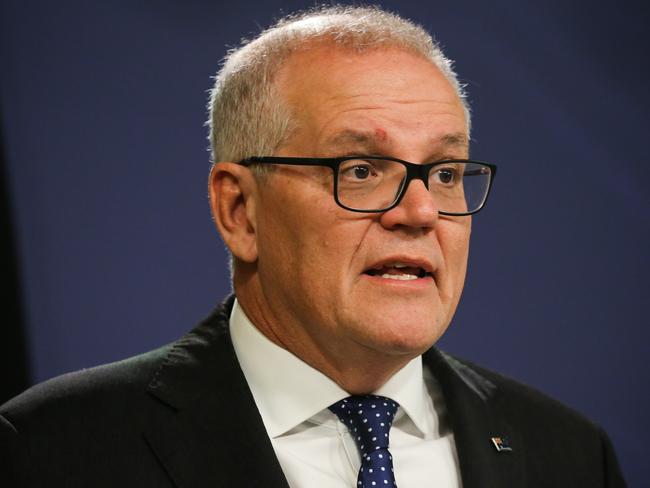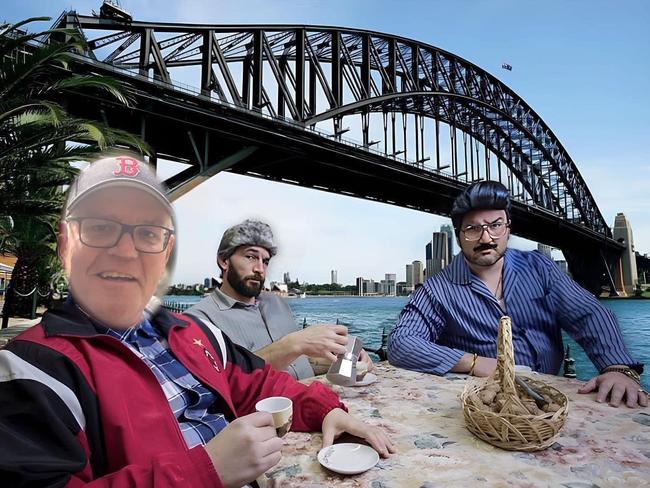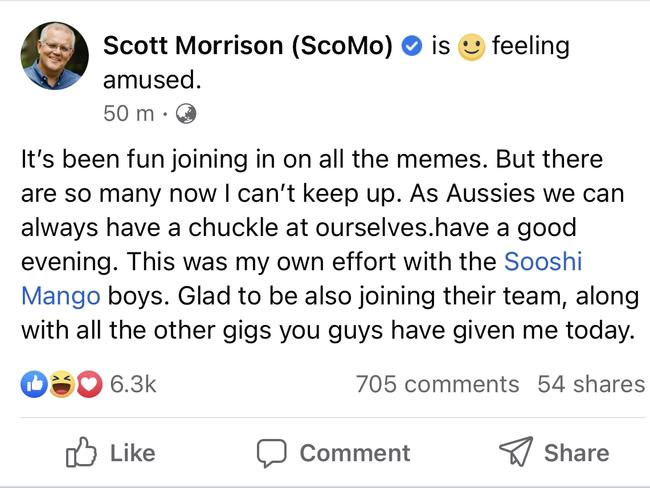James Campbell: Former PM’s ministry grab more strange than sinister
Morrison’s ministry grab sin appears to have been he dispensed with the niceties and allocated the power to himself rather than deferring to the fiction that he wasn’t the boss, writes James Campbell.
Opinion
Don't miss out on the headlines from Opinion. Followed categories will be added to My News.
One of the most depressing and predictable things these days is that whenever the conservative side of politics is revealed to have done something dodgy, you can’t take the time to enjoy it because annoying lefties immediately squawk such over-the-top nonsense that the alleged wrongdoing suddenly seems ridiculous rather than sinister.
We saw this time and again during the Trump presidency, so much so that by the end of his four years in the White House plenty of people were prepared to ignore those warning he would do everything he could to hold onto office even when it was obvious he’d lost.
Like many people last week, including some of the ministers themselves, my first thought on hearing that Scott Morrison had taken on his colleagues’ jobs without telling them or the public was ‘that’s pretty weird’.
That the people who seemed to regard themselves as the principal victims of his deception – the members of the Canberra press gallery – are also some of Australia’s most pompous and self-important, just added to the fun.
Obviously some of the people affected were hurt by Morrison’s actions, especially poor old Josh Frydenberg who seemed to think they had some kind of special relationship, but since the powers he gained were, with one exception, never exercised, the episode seems odd rather than scandalous.

The one occasion when Morrison did use the powers – to nix the PEP-11 gas drilling permit off the east coast – didn’t lead to a different outcome.
Given the political pressure the government was under in the seats where PEP-11 had become a hot issue, there was no chance in hell it was going to be approved, especially as the NSW Government was running a mile from the issue.
The only practical effect of Morrison taking the decision himself, rather than forcing the Resources Minister Keith Pitt to take it, was to avoid putting Pitt in the embarrassing position of being forced to resign on principle if he really objected to what the PM wanted him to do. You could argue of course that Pitt should have resigned anyway rather than let Morrison take the decision but that’s not really something that should trouble the rest of us.
That the nation’s political journalists should have worked themselves into a condition over the story is no surprise, since it involved (1.) kicking a man when he’s down and (2.) Scott Morrison, who most of them loathe.
But did the Prime Minister of Australia really need to join in the fun quite as hard as he did?
He was still at it on Friday, talking about our “precious” cabinet system of government “derived from the Westminster system” which “relies upon checks and balances”.

From listening to Albo talk about Morrison undermining democracy and his “contempt for our Parliamentary democracy, and contempt for our Westminster system of accountability,” you’d think we’d just had a narrow escape from a Pinochet’s Chile rather than a shock revelation that Scotty had been adding to his marble collection behind the backs of the other kids.
And the fact is, although we say we have a cabinet system of government, it doesn’t operate in any way that Walter Bagehot, the author usually credited as the first to describe it, would recognise.

The first cabinets – groups of ministers acting in concert – came together in the 18th century to stop kings getting their way by picking them off one-by-one.
Today of course, although acts are carried out in its name we acknowledge the crown is a cipher, but though we pretend otherwise, so is the cabinet.
In reality, although PMs defer to their cabinets, they do it the same way Roman emperors pretended to defer to wishes of the senate, that is to say not at all.
It’s been clear for decades that real power resides in the hands of PMs and their personal offices.
Sure, legislation here and there delegates or and allocates decisions to be made by individual ministers, but again, how much discretion they actually exercise when making them is something that is decided by the PM.
Morrison’s sin appears to have been to dispense with the niceties and to allocate this power to himself rather than deferring to the fiction that he wasn’t the boss.
Why he chose to do that will remain a mystery.
Assuming he wasn’t lying, from the nonsense he was spouting about the immediate crisis of the pandemic emergency – even though he grabbed some these ministries more than a year later – it’s pretty clear that he can’t really explain his behaviour even to himself.
Obviously this is unlikely to happen again and if it does it won’t be secret.
But does it matter? Was it some kind of threat to our democracy? Pull the other one.





